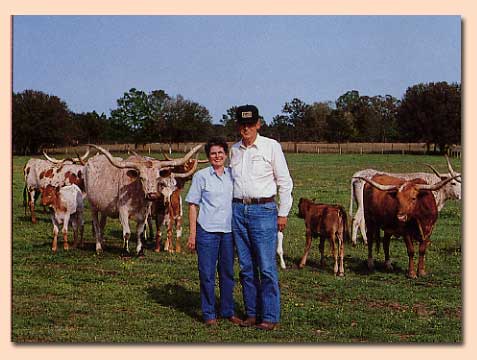 Anywhere you go in today's Longhorn world, you are more than likely to hear arguments regarding what is or is not a "true Texas Longhorn." According to many "experts" (which tend to be whomever has the floor at the moment), the true Texas Longhorn is one that looks "just like they did when they ran wild in Mexico 300 years ago." To others, a true Texas Longhorn is an animal with long horns - a fairly straightforward philosophy. And yet to another faction, the Texas Longhorn can indeed be "all things to all people," and there is room for much discussion on "what makes a Longhorn."
Anywhere you go in today's Longhorn world, you are more than likely to hear arguments regarding what is or is not a "true Texas Longhorn." According to many "experts" (which tend to be whomever has the floor at the moment), the true Texas Longhorn is one that looks "just like they did when they ran wild in Mexico 300 years ago." To others, a true Texas Longhorn is an animal with long horns - a fairly straightforward philosophy. And yet to another faction, the Texas Longhorn can indeed be "all things to all people," and there is room for much discussion on "what makes a Longhorn."
One place where you won't hear any grumbling about the nature of the breed in located off of Highway 25 in southern Louisiana - Johnnie and Ruth Hoffman's Seven T Ranch. The Hoffman spread is home to 125 head of some of the most spectacular cattle you'll have the pleasure to see, and there's no disputing that these numbers are true Texas Longhorns, They're not starved and they're not fat- they're solid bodied, good-horned cattle, the kind that any new breeder would do well to select from when starting a foundation herd. These cattle are the products of a fourteen-year quest for excellence, and the Hoffman ended up with the "right kind."
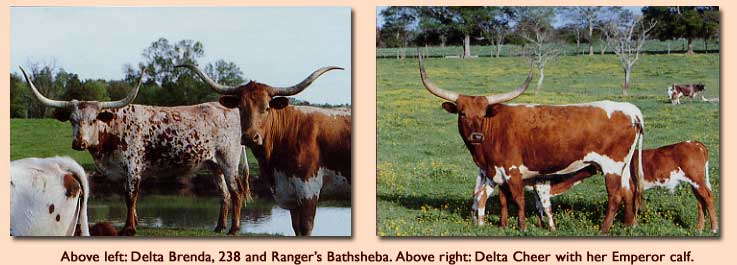
"We go our first longhorns in 1977, after I got tired of raising big commercial animals that were costing us a lot of money," says Johnnie. "A fellow by the name of Bobby Hyde at Robert, Louisiana was trying to get into the commercial cattle business and had a small herd of Longhorn, so I swapped mine for his." (One of those original seventeen head is still a member of the Hoffman herd.) From there, Johnnie and Ruth proceeded to add to their herd through private treaty purchases and various auction sales. "I met Blackie Graves not long after we got into the business, and he shared a lot of his knowledge of the breed with me," Johnnie explains. "We're good friends today, so I'd have to say that he's treated me pretty fairly." (Among the animals which Johnnie and Blackie have owned in partnership is a Monarch son named Laramie 27, which sold at the 1991 Louisiana Purchase sale for $9,500.) "We also bough some cattle from the King Ranch and Leonard Stiles, who is a good friend of mine as well. Darol Dickinson also sold me some fine cattle, and I've done a lot of business with him through the years."
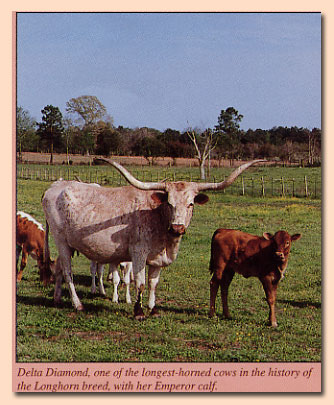 The Butler influence, introduced to Johnnie mainly through Blackie Graves, is highly visible in the Seven T herd, with plenty of horn to go around. These cattle are not, however, the small-bodied, pin-horned, "runts" that soiled the Butler bloodline's reputation in the 1980's. There is color and sound conformation throughout, and the Hoffman breeding philosophy insures an all-around quality that serves both function and visual appeal.
The Butler influence, introduced to Johnnie mainly through Blackie Graves, is highly visible in the Seven T herd, with plenty of horn to go around. These cattle are not, however, the small-bodied, pin-horned, "runts" that soiled the Butler bloodline's reputation in the 1980's. There is color and sound conformation throughout, and the Hoffman breeding philosophy insures an all-around quality that serves both function and visual appeal.
"We never bought into the craze that sacrificed all other qualities just for the sake of 60-inch horns," says Johnnie. "As you can see, we get all the Longhorn you could ask for, without cutting corners in any other area. It's a fact that Milby Butler's Longhorn bloodline got some criticism it didn't deserve, simply because some people who were out to make a quick buck bred out some of the important qualities of the cattle, while still calling them "Butler Longhorns."
The love for the cattle that Johnnie and Ruth have is easily apparent as they show off the herd to some appreciative guests from Houston. "They were part of my life as a boy, since my grandfather had a small herd of Longhorns, and they keep me in touch with the country where I grew up - South Texas."
Johnnie was born and raised in Gonzales County, and following three years in the service,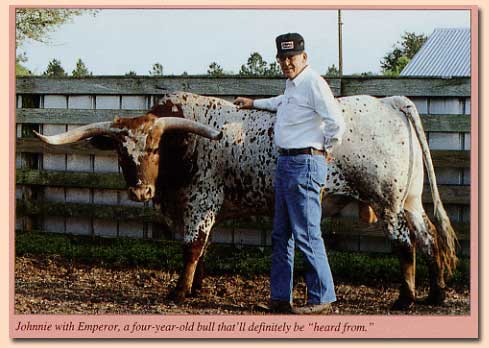 went to work at age twenty as a roughneck in the plentiful oil fields of the territory. He came to Louisiana with a rig that was bound for the gulf – one of the very first offshore drilling operations. He worked his way up through the ranks, and following his retirement from Noble Drilling Company in 1986, was bestowed the honor of having an offshore rig named "Johnnie Hoffman."
went to work at age twenty as a roughneck in the plentiful oil fields of the territory. He came to Louisiana with a rig that was bound for the gulf – one of the very first offshore drilling operations. He worked his way up through the ranks, and following his retirement from Noble Drilling Company in 1986, was bestowed the honor of having an offshore rig named "Johnnie Hoffman."
"You may say I'm retired, but I sure don't know where all the free time is keeping itself," he smiles. (Johnnie's expertise is still called upon regularly.")
Ruth grew up in the small Louisiana town of Des Allemands, Louisiana where she and Johnnie met in 1949. Although she wasn't exactly sure that Johnnie knew what he was doing when he jumped into the Longhorn business fourteen years ago, she's long since been a "Longhorn lover." "They're easy to get attached to, especially the ones that think they're your pets," she says.
Since 1977, the Hoffmans have purchased, owned, and sold many of the better known animals in the history of the breed. Names like Classic, Monarch (whom the Hoffmans owned in partnership with Blackie Graves), Delta Diamond and Dode's Boy are all part of the Seven T's legacy, along with (of course) the impressive line of "Dixie" bulls. Dixie Rebel, Dixie Hunger, Dixie Rules (the sire of the 1990 Texas Longhorn Journal Bull of the Year, Bob and Linda Moore's Johnnie Reb) and the rest all came from the Hoffman program. Another soon-to-be household name is the bull Emperor, a four-year-old that has produced some outstanding calves out of mostly Butler-bred cows. "I'm real pleased with the bull, and the calves we're getting from him are worth getting excited about." He was purchased as a yearling from Dickinson Ranch in 1998.
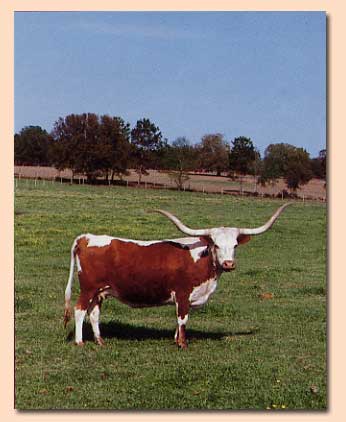
"We've done pretty well with our selection and breeding combinations, and we've been real fortunate to develop relationships with quality people who believe in fair play," says Johnnie. "I believe that everything you do comes back to you, and I think that's reflected in our operation," he adds, referring to the tremendously successful private treaty business the Hoffmans have enjoyed for several years. "I have a lot of respect for men like Blackie Graves, R.L. Londot, Braxton Blake and Leonard Stiles – the kind of folks that you can take at their word."
Johnnie has, through sales and just "getting around," introduced a number of people to the Texas Longhorn industry - including many of today's prominent breeders. Londot's Ace Cattle Company, Johnnie and Ruth's just-up-the-highway neighbors, purchased their first Longhorns from the Seven T in 1983, and just about everybody from Louisiana to Florida have either gotten their start from the Hoffmans or have some Seven T's animals in their present herds.
One of the biggest keys to the prominence of the Hoffman name in the Longhorn business has been the success of the Hoffman / Ace Cattle Co . sponsored Louisiana Purchase Sale, which has been held annually since 1988 at Covington, Louisiana. The sale has been a blueprint for putting on Longhorn auctions, with top-quality animals, well-respected guest consignors, and a high level of organization for the event. The sale is also one of the more inviting activities on the Longhorn calendar, as the Louisianan charm and relaxed atmosphere of the surroundings make sale-goers feel right at home.
The practice at making folks comfortable should come in real handy for Johnnie and Ruth, as they and the Ark-La-Tex Breeders Association prepare to host the 1991 TLBAA Convention in October in New Orleans.
"Our biggest problems may be keeping everybody from having too good a time," Ruth laughs. "We hope to see all our friends down there, and make some new ones," Johnnie adds.